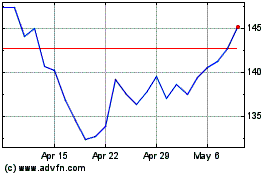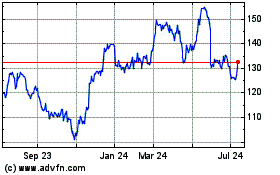Agilent Companion Diagnostic Gains Expanded FDA Approval in Head and Neck Squamous Cell Carcinoma (HNSCC)
June 11 2019 - 7:56AM
Business Wire
PD-L1 IHC 22C3 pharmDx can now be used as an aid to identify
HNSCC patients for treatment with KEYTRUDA® (pembrolizumab)
Agilent Technologies Inc. (NYSE: A) today announced that the
U.S. Food and Drug Administration (FDA) has approved its PD-L1 IHC
22C3 pharmDx assay for expanded use.
The assay is now approved as an aid in identifying patients with
head and neck squamous cell carcinoma (HNSCC) for treatment with
KEYTRUDA® (pembrolizumab), anti-PD-1 therapy manufactured by Merck
(known as MSD outside the United States and Canada). KEYTRUDA, as a
single agent, is indicated for the first-line treatment of patients
with metastatic or with unresectable, recurrent HNSCC whose tumors
express PD-L1 (CPS ≥ 1) as determined by an FDA-approved test.
PD-L1 IHC 22C3 pharmDx is the only companion diagnostic
FDA-approved to aid in the identification of HNSCC patients for
treatment with KEYTRUDA. HNSCC is the fifth cancer type for which
PD-L1 IHC 22C3 pharmDx has gained FDA approval in the United
States.
“Targeted immunotherapies are redefining standards of care in
cancer treatment, and PD-L1 testing plays a crucial role in
identifying patients who may benefit from this treatment,” said Sam
Raha, president of Agilent’s Diagnostics and Genomics Group. “The
expanded FDA approval of PD-L1 IHC 22C3 pharmDx provides critical
information to physicians managing first-line treatment of patients
with metastatic or with unresectable, recurrent HNSCC. By expanding
the use of PD-L1 IHC 22C3 pharmDx, Agilent enables more patients to
be identified for treatment with KEYTRUDA. Through these efforts,
we reinforce our role as a worldwide leader in driving companion
diagnostics to market in support of landmark therapies.”
HNSCC is the seventh most common cancer worldwide3 and accounts
for more than 90% of head and neck cancer cases.4 In the United
States, approximately 65,000 new head and neck cancer cases are
diagnosed annually.5,6 The five-year overall survival rate for this
form of cancer is approximately 40–50 percent.7
KEYTRUDA is a humanized monoclonal antibody that increases the
ability of the body's immune system to help detect and fight tumor
cells. KEYTRUDA blocks the interaction between PD-1 and its
ligands, PD-L1 and PD-L2, thereby activating T lymphocytes, which
may affect both tumor cells and healthy cells. KEYTRUDA and other
targeted immunotherapies are revolutionizing cancer treatment, and
their therapeutic value is being demonstrated across a growing list
of cancer types.
Agilent is a worldwide leader in partnering with pharmaceutical
companies to develop immunohistochemical-based diagnostics for
cancer therapy. Agilent developed PD-L1 IHC 22C3 pharmDx in
partnership with Merck & Co. PD-L1 IHC 22C3 pharmDx also helps
physicians identify non-small cell lung cancer (NSCLC), cervical
cancer, gastric or GEJ adenocarcinoma, and urothelial carcinoma
patients for treatment with KEYTRUDA. PD-L1 expression in NSCLC
tissues is interpreted using Tumor Proportion Score (TPS). PD-L1
expression in HNSCC, urothelial carcinoma, cervical cancer, and
gastric or GEJ adenocarcinoma tissues is interpreted using Combined
Positive Score (CPS).
About Agilent Technologies
Agilent Technologies Inc. (NYSE: A) is a global leader in life
sciences, diagnostics, and applied chemical markets. Based on more
than 50 years of insight and innovation, Agilent instruments,
software, services, solutions, and people provide trusted answers
to customers’ most challenging questions. The company generated
revenues of $4.91 billion in fiscal 2018 and employs 15,550 people
worldwide. Information about Agilent is available at
www.agilent.com. To receive the latest Agilent news, subscribe to
our Newsroom. Follow Agilent on LinkedIn, Twitter, and
Facebook.
References:
1. PD-L1 IHC 22C3 pharmDx [package insert]. Carpinteria, CA:
Dako, Agilent Pathology Solutions; 2019. 2.
KEYTRUDA [package insert]. Kenilworth, NJ:
Merck & Co., Inc.; 2019.
3. Seiwert, T.Y.; Burtness, B.; Mehra, R.; Weiss, J.; Berger, R.;
Eder, J.P.; Heath, K.; McClanahan, T.; Lunceford, J.; Gause, C.;
Cheng, J.D.; Chow, L.Q. Safety and Clinical Activity of
Pembrolizumab for Treatment of Recurrent or Metastatic Squamous
Cell Carcinoma of The Head and Neck (KEYNOTE-012): An Open-label,
Multicenter, Phase 1b Trial. Lancet Oncol. 2016, 17 (7), 956-965.
4. Gupta, B.; Johnson, N.W.; Kumar, N. Global Epidemiology of Head
and Neck Cancers: A Continuing Challenge. Oncology. 91, 13-23. 5.
Siegel, R.L.; Miller, K.D.; Jemal, A. Cancer Statistics, 2018. CA
Cancer J. Clin. 2018, 68 (1), 7-30. 6. Siegel, R.L.; Miller, K.D.;
Jemal, A. Cancer Statistics, 2019. CA Cancer J. Clin. 2019, 69 (1),
7-34. 7. World Health Organization. 2014 Review of Cancer Medicines
on the WHO List of Essential Medicines: Locally Advanced Squamous
Carcinoma of the Head and Neck.
https://www.who.int/selection_medicines/committees/expert/20/applications/HeadNeck.pdf.
Published 2014 (accessed January 25, 2019).
View source
version on businesswire.com: https://www.businesswire.com/news/home/20190611005542/en/
Victoria Wadsworth-HansenAgilent Technologies+1 408 553 2005+45
2933 6980victoria.wadsworth-hansen@agilent.com
Agilent Technologies (NYSE:A)
Historical Stock Chart
From Mar 2024 to Apr 2024

Agilent Technologies (NYSE:A)
Historical Stock Chart
From Apr 2023 to Apr 2024
